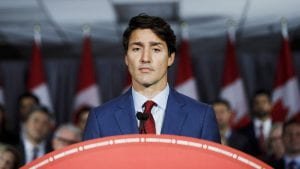By Anna Mueller
In the 2015 federal election, Justin Trudeau was chosen to be the Prime Minister of Canada. As a member of the Liberal Party, Justin Trudeau’s platform was primarily focused on strengthening Canada as a whole. Specifically, he wanted to help the middle class economically, claiming that doing so would benefit the entire country. Trudeau also planned to address climate change and “renew” Canada’s relationship with Indigenous Peoples.
Leading up to the 2019 federal election, the focus on strengthening the country still remained for Justin Trudeau and the Liberal party, with the addition, however, of strengthening gun control. Unfortunately, Trudeau encountered a few self-inflicted challenges during his campaign for re-election. One example is his career-risking affair with the Montréal-based engineering company SNC-Lavalin in attempt to save it from criminal prosecution. Another example was a photograph that depicted Trudeau in blackface at a costume party in 2001. This revelation prompted the discovery of another similar occurrence. These controversies hurt Trudeau’s chances of winning and moving into his second term.
Despite the obstacles, the election results determined a Liberal government, but one with a minority decision. Trudeau will go on to serve his second term, but he will have to prove his political responsibility and demonstrate his abilities as Prime Minister like never before. The addition of the Bloc Québécois (BQ) party was a significant source of the Liberal party’s decline in Parliamentary seats. The BQ, a group devoted to the promotion of Quebec sovereignty, adopted many ideas from the Liberal platform which caused many Québécois with Liberal-aligning views to vote BQ instead of Liberal.
Ultimately, the results of the election mean that Justin Trudeau will have to find a balance in order to make legislative changes. When a minority government is in power, it is much harder to stick to the winning party’s agenda because it must get the support of another party on legislative action. Not only is the job of a minority government leader more difficult due to the requirement to work with other parties, but it is also always at risk of losing power. A minority government in Canada could mean that at any point, measures could be taken to call another vote, and once again Trudeau’s position will be at risk.
One key example of a situation in which Trudeau will need to find a balanced and diplomatic solution is the issue of the Trans Mountain Pipeline. For years, Alberta and Saskatchewan have claimed that they have not been receiving assistance from the federal government during their recent economic downturn. Alberta has the third largest oil reserves in the world, but it is landlocked, making it difficult to compete in the global market. Essentially, Alberta can’t make money off of its oil sands if it is not sold outside of Alberta. This is driving oil and gas sales down drastically and agitating many Albertans whose lives rely on the oil and gas industry. To address this provincial anger, Trudeau promised to build a pipeline—the Trans Mountain Pipeline—which would transport oil from Alberta to the coast of British Columbia.
The conflict is that the NDP (New Democratic Party), the Green party, and almost all of the province of British Columbia are opposed to the construction of this pipeline. The environment is arguably the largest concern, as well as the rights of Indigenous peoples who live in the proposed pipeline route. These two concerns, however, are two of the most pressing issues that Justin Trudeau and the Liberal party based his campaign on. If Trudeau can’t get support from the NDP or the Green party on the pipeline, then he will have to consider turning to the Conservatives—the party that opposes most of Trudeau’s most basic ideas. There is significant pressure on Trudeau from both sides of this issue. In fact, there is now even a growing movement for western separatism in Alberta.
For Trudeau and the Liberals to remain in power in Canada, they will need to work with other parties. However, to satisfy parts of the country that voted primarily Conservative, (e.g., Alberta and Saskatchewan) they will have to make some sacrifices as well. Ultimately, the results of the election really reveal the extremity of Canada’s division—Alberta and the Trans Mountain Pipeline is only one example of it. We can only hope that Trudeau will work to find a balance and resolve some of the division that has overtaken the country.
Sources:
- https://www.liberal.ca/wp-content/uploads/2015/10/New-plan-for-a-strong-middle-class.pdf
- https://2019.liberal.ca/our-platform/
- https://www.cbc.ca/news/politics/trudeau-wilson-raybould-attorney-general-snc-lavalin-1.5014271
- https://ottawacitizen.com/news/local-news/a-crash-course-in-what-minority-government-would-look-like
- https://www.cbc.ca/news/politics/trudeau-western-canada-trans-mountain-1.5332365
Photo Credit: https://www.vanityfair.com/style/2019/09/justin-trudeau-blackface-apology

